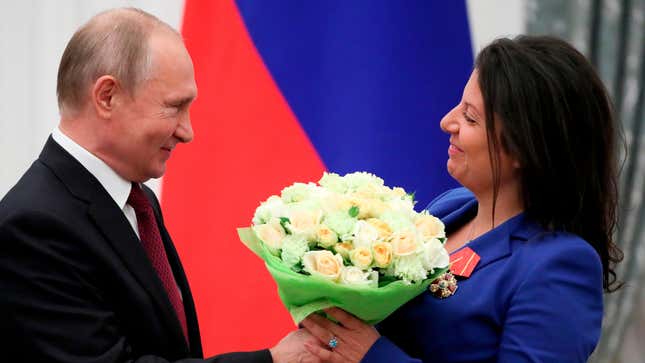
Russia’s Foreign Ministry has threatened harsh retaliatory measures against YouTube after the video sharing service suspended two German-language accounts run by Russian state media, according to a report from Russia’s TASS news outlet. Russia went so far as to call the suspensions “information warfare.”
The YouTube accounts, RT Germany and Der Fehlende Part, were reportedly deleted after spreading misinformation about the covid-19 pandemic and had a combined subscriber count of roughly 700,000 before being deleted.
RT Germany was initially suspended from posting new videos for a week after breaching YouTube’s covid-19 misinformation rules, but the account was deleted completely after RT allegedly uploaded the content again to another channel called Der Fehlende Part, or “The Missing Part,” in English.
“Considering the nature of the incident, which is fully in line with the logic of the information warfare unleashed against Russia, taking retaliatory symmetrical measures against the German media in Russia would seem not just an appropriate, but also a necessary thing to do, especially taking into account that [the German media] were caught interfering into our country’s domestic affairs on several occasions in the past,” the Russian Foreign Ministry said in a statement to TASS on Tuesday.
“Considering that multiple requests for returning to compliance with international obligations to protect media freedoms and the freedom of speech were ignored by the German side, we view such measures as the only possible way to encourage our partners to engage in a constructive and meaningful dialogue about this unacceptable situation,” the statement continued.
It’s not clear whether “retaliatory measures” against YouTube would include banning the website in Russia, but the government has made similar threats before—including in 2020 when YouTube posted notices on videos that were uploaded by state-sponsored media.
The editor-in-chief of RT, Margarita Simonyan, called for not just sanctions against YouTube, but a ban on German broadcasters in Russia, such as state-media channel DW.
“I really look forward to the fact that my native state will, without delay, ban Deutsche Welle and other German media outlets in Russia, and close the bureaus of [German broadcasters] ARD and ZDF. I’m keeping quiet about sanctions against YouTube itself. Though we should do this, out of self-respect,” Simonyan said on Telegram, according to an English translation by Russia’s Meduza news outlet.
While Alphabet-owned YouTube reportedly banned the two Russian accounts over covid-19 misinformation, RT’s English language channel highlighted YouTube rules against questioning the recent German election results on Tuesday.
Election misinformation is yet another topic that YouTube has struggled to control in recent years, quite notably in the U.S. after former President Donald Trump took power. Russian President Vladimir Putin infamously wanted Trump to win in 2016 and RT’s U.S. channel was filled with pro-Trump propaganda in an effort to get him elected.
Whatever the precise reason for YouTube’s ban on RT Germany, Russia clearly doesn’t believe that YouTube’s actions are simply a matter of internal corporate policy, but a battleground in the New Cold War.
“The goal of this aggression against the Russian media holding’s projects is evident: to silence information sources that go beyond the media agenda that German officials find convenient,” the Russian Foreign Ministry said.
YouTube did not immediately respond to a request for comment early Wednesday but Gizmodo will update this post if we hear back.